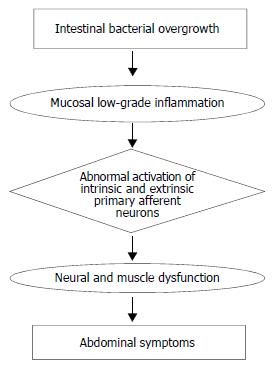Copyright
©The Author(s) 2003.
World J Gastroenterol. Jul 15, 2003; 9(7): 1385-1389
Published online Jul 15, 2003. doi: 10.3748/wjg.v9.i7.1385
Published online Jul 15, 2003. doi: 10.3748/wjg.v9.i7.1385
Figure 1 Diverticular disease: putative role of intestinal bacterial overgrowth in symptom development.
Altered intestinal microflora could contribute to chronic low-grade inflammation (supported by both immunocytes and mast cells) which abnormally sensitised both intrinsic primary efferent and extrinsic primary afferent neurons. This condition could lead to neural and muscle dysfunction (i.e. altered intestinal motility and visceral sensitivity) and, finally, to symptom development.
- Citation: Colecchia A, Sandri L, Capodicasa S, Vestito A, Mazzella G, Staniscia T, Roda E, Festi D. Diverticular disease of the colon: New perspectives in symptom development and treatment. World J Gastroenterol 2003; 9(7): 1385-1389
- URL: https://www.wjgnet.com/1007-9327/full/v9/i7/1385.htm
- DOI: https://dx.doi.org/10.3748/wjg.v9.i7.1385









